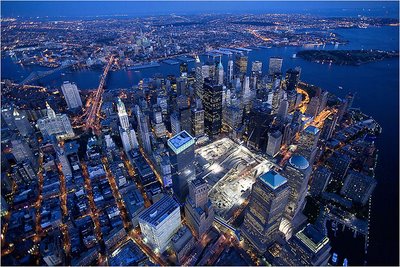Is it because the Bush administration has done such a terrific job of homeland security? Because Americans are more vigilant? Because Al Qaeda has been weakened and may be incapable of launching another attack on the scale of 9/11? Because the Iraq war has been a distration for terrorists? The answer, according to an excellent New York Times article, is some of all of the above.
The nut grafs:
There is a consensus among counterterrorism officials and independent experts that the government’s actions over the last five years — from the dismantling of camps run by Al Qaeda and the decimation of its leadership, to the tightening of visa and border controls, to the scores of terrorism-related prosecutions — have made the country a harder target.
The Age of Terror, at least inside the United States, has morphed into the Age of the Foiled Plot. But this very success has led to a new debate. The government says the record vindicates its prevention strategy — to intervene long before an attack is imminent. Its critics assert that officials have exaggerated the threat posed by some accused plotters, painting hapless misfits as Qaeda operatives.
None of this means that a serious plot isn’t being hatched now, invisible even to a counterterrorist bureaucracy hugely expanded since 2001. But five years of evidence suggests that the terrorist threat within the United States is much more modest than was feared after 9/11, when it seemed quite possible that there were terrorist sleeper cells in American cities, armed with “weapons of mass destruction” and awaiting orders to attack.
More here.
He reminds us that we know the names of the attackers, but not the victims. He's right. I could only come up with three, including Todd Beamer, the passenger who helped overcome the hijackers who planned to fly United Airlines Flight 93 into the nation's capital, and that's probably two more than most folks.More here.
Meanwhile, The New York Times, in interviews with the families of the victims, finds that many are still grieving, but have found constructive ways of moving on without forgetting. More here.
These families were initially interviewed for The Times' Pulitzer Prize-winning "Portraits of Grief Project," which can be read here.
'SAFETY IS IN THE EYE OF THE BEHOLDER'
An excerpt from Will's essay on the anniversary of the attacks:
As you reflect today on the deadly terrorist attacks . . . and everything that has happened in America and around the world in the five years since then, you probably didn’t think of Philly’s soaring crime rate, or a commercial aviation disaster from human error.More here.But maybe you should.
Because one of the many effects of 9/11 — seldom mentioned — is that when the White House declared a “war on terror” and America made that the No. 1 priority, other issues began to get short shrift, some that had dominated the national agenda during a very different 1990s.
On Sept. 12, 2001, the
Daily News , in a story written by this reporter, predicted that “America would never be the same again.” That prediction was right, but in ways both large and small that no one anticipated. Few predicted that Americans would still be fighting and dying halfway around the world in five years, that there would be curbs on civil liberties or that a nation that came together in tragedy would now be torn asunder by political rancor.
More here.
REMEMBERING SEPTEMBER 11, 1565
It was on that date in 1565 that a tiny contingent of European knights and the entire population of Malta dealt Ottoman Turkey a decisive defeat, and in doing so may have saved western civilization.
More here.

No comments:
Post a Comment